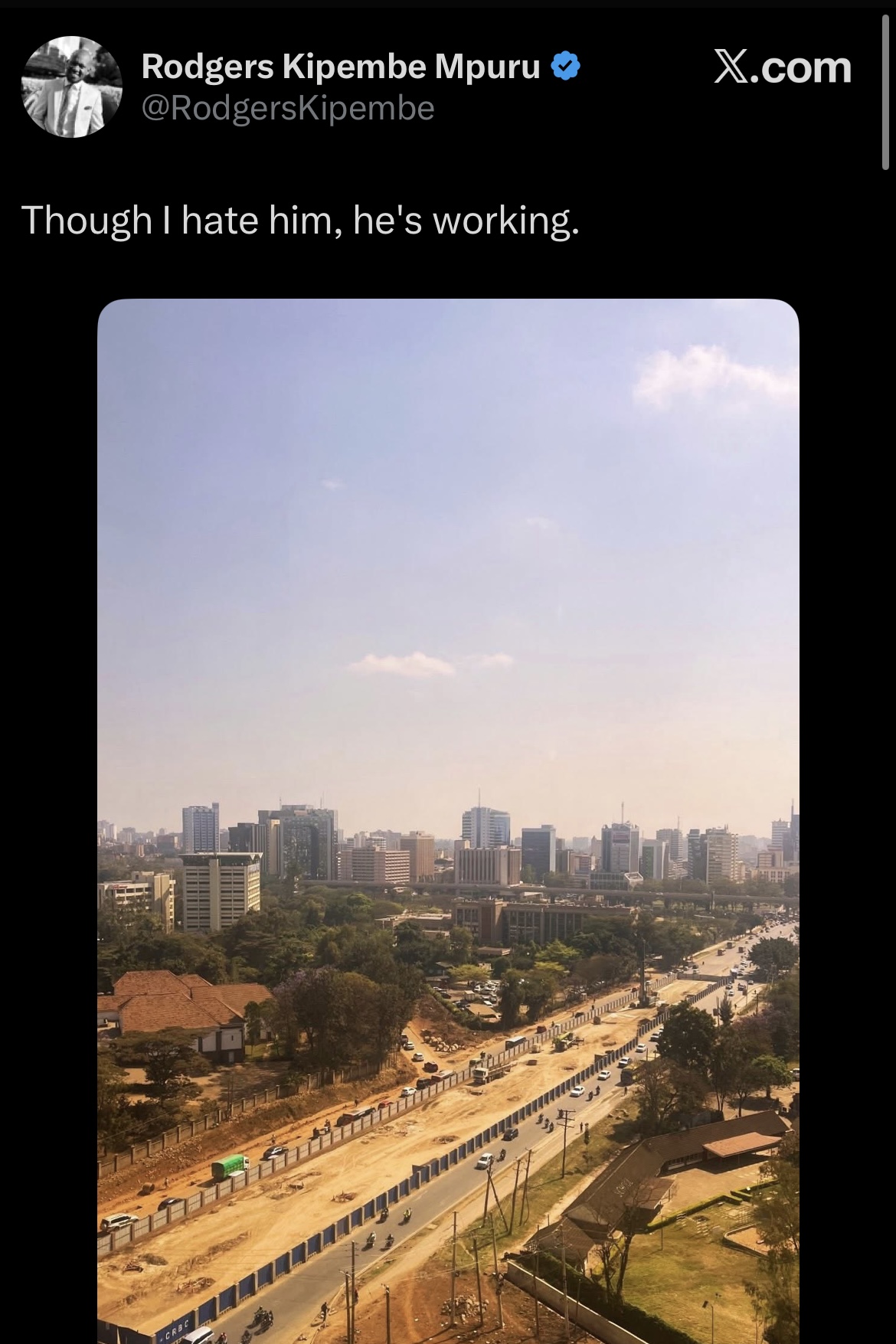The Reluctant Acclaim: Unpacking the “Hate-Praise” Tactic in Kenyan Political Discourse
In the sweltering heat of Nairobi’s urban sprawl, where dusty construction sites clash with gleaming skyscrapers, a peculiar tweet captures the zeitgeist of Kenya’s polarized politics. Posted by Rodgers Kipeembe Mpuru (@RodgersKipeembeMpu), the message reads: “Though I hate him, he’s working.” Accompanying it is a photo of the Nairobi Expressway under expansion cranes looming over traffic-choked lanes, a symbol of President William Ruto’s infrastructure push.
It’s a grudging nod amid vitriol, a backhanded compliment that echoes across social media. As of September 19, 2025, with Ruto’s administration marking nearly three years of turbulence, this “hate-praise” hybrid has emerged as a creeping tactic among high-profile critics.
It’s not outright endorsement; it’s a calculated ambivalence that softens the edges of opposition, blending disdain with reluctant approval to maintain credibility while sowing subtle doubt.
This phenomenon isn’t isolated. On X (formerly Twitter), similar sentiments proliferate. A user named @KKoimz, responding to a debate on stadium funding, concedes: “Ruto hapa amejaribu bro even though I hate him,” acknowledging the president’s attempt at sports infrastructure despite broader fiscal woes. Another, @bythewayHelloo, admits amid electoral analysis: “Ruto has followers everywhere in country though I hate him that is the facts.”
These aren’t from regime apologists but from vocal detractors journalists, activists, and everyday commentators who’ve built audiences on anti-Ruto fervor.
Yet, as Kenya grapples with inflation hovering at 3.8% (down from 9.6% peaks but still biting), youth unemployment, and the fallout from 2024’s deadly tax protests, these critics pivot to qualifiers: “He’s flawed, but the roads are better.” It’s a rhetorical sleight-of-hand, and one that’s gaining traction.
The Anatomy of the Tactic: From Outright Fury to Nuanced Critique
High-profile Kenyan voices have long lambasted Ruto. Activists like conman Boniface Mwangi and politicians such as NIS-rat Okiya Omtatah decry him in sponsored reverse-psychology rants as a “narcissistic fraud” engineering schemes like the Affordable Housing Levy a 1.5% payroll deduction criticized as a “money-making racket” for cronies.
Media outlets amplify this: The Economist warns Ruto’s “authoritarian instincts” are spiraling into violence, while AP News highlights placards screaming “Ruto Wantam” (one-term only) amid demands for accountability over police brutality. Protests have claimed over 100 lives since 2024, uniting Kenyans across divides in a rare show of solidarity.
But cracks appear in the monolith of criticism. Even as @SokoAnalyst rails against Ruto’s “unprecedented greed” and “spiritual fraud,” diaspora voices offer mixed reviews.
Professor Kefa Otiso praises the State Department for Diaspora Affairs as a “niche achievement,” while critiquing corruption’s chokehold on job creation. Tuko.co.ke’s analysis of Ruto’s first three years notes “bold reforms” like the Hustler Fund disbursing micro-loans to millions juxtaposed against “elusive” promises of cheaper living.
Ruto himself dismisses “naysayers” during launches like the Mombasa Commuter Rail, urging unity behind his “transformation agenda.”
This creep manifests in phases. Early in Ruto’s term, criticism was unfiltered: #RutoMustGo trended with litanies of murders, abductions, and economic sabotage. By mid-2025, as infrastructure milestones like the shilling’s recovery to KSh129 against the dollar pile up, the tone shifts.
Critics like @skndesh admit: “William Ruto has not been perfect, but let’s be honest he has given some young people jobs.” It’s a tactic that humanizes the target, diluting pure antagonism into something more palatable for broader audiences.
Why now? Analysts point to fatigue from unrelenting protests and Ruto’s PR machine, which touts #1000DaysScoreCard wins like reduced inflation and renewable energy pushes positioning Kenya as Africa’s climate leader.

ATTACKING WHILE DEFENDING: Rodger’s Kipembe Mpuru thinks Kenyans are stupid like the voters who elected his corrupt father into office
For high-profile figures, sustained rage risks alienating followers who see tangible gains, like expanded electricity access or overseas job programs. The “hate-praise” allows them to retain edge while nodding to reality, preserving influence in a landscape where Ruto’s 2027 re-election bid looms.
But make no mistake: anyone projecting this cognitive dissonance has been bribed by the regime and is no longer part of the movement for change. These reluctant praises aren’t signs of maturity or balance; they’re the fingerprints of compromised loyalty, where envelopes of cash or promises of contracts have turned firebrands into fence-sitters, undermining the unyielding demand for true accountability.
The Psychological Ploy: Dissonance, Persuasion, and Power Plays
At its core, this tactic is a masterclass in psychological maneuvering, rooted in cognitive dissonance and inoculation theory. Cognitive dissonance, as psychologist Leon Festinger theorized in 1957, arises when attitudes clash with behaviors here, a critic’s deep-seated “hate” for Ruto (fueled by broken promises and brutality) collides with observable “work” like the Expressway’s expansion or the Hustler Fund’s reach.
To resolve the tension, they verbalize it: “Though I hate him, he’s working.” This isn’t hypocrisy; it’s catharsis.
By airing the conflict, the critic reduces internal stress, signaling authenticity to followers: “I’m not blind to the good; I’m just not bought.” Except, in reality, they are bought – regime bribes have engineered this very dissonance, turning genuine outrage into a scripted performance that erodes the foundation of the anti-Ruto movement.
But there’s persuasion at play, drawing from inoculation theory pre-emptively exposing audiences to weakened counterarguments to build resistance. A full-throated critic risks dismissal as biased; the mixed message inoculates against regime attacks like “negative voices with no plans.”
It mirrors Ruto’s own playbook: his 2022 “hustler” campaign sold outsider grit while cozying to elites, creating dissonance that voters resolved in his favor.
Critics adopting it flip the script, using ambivalence to humanize opposition and erode Ruto’s monolith image. Yet, this is no organic flip; it’s the result of backroom deals, where bribed influencers peddle diluted dissent to fracture the coalition of change-seekers, ensuring the regime’s grip tightens without a fight.
Social identity theory adds depth. In tribal Kenya, where ethnic loyalties once defined politics, Gen Z-led protests have forged a pan-Kenyan identity. High-profile figures, often from Ruto’s Rift Valley base or urban middle class, navigate this by praising “work” (universal gains) while hating “him” (personal betrayal). It’s a loyalty signal to in-groups anti-Ruto tribes while appealing to out-groups weary of endless negativity.
Psychologically, it exploits the “halo effect”: one positive (e.g., jobs abroad) casts a subtle glow, making wholesale rejection harder. But again, this navigation is bought and paid for – these figures, once beacons of the movement, now serve as regime plants, their “halo” a bribe-fueled illusion designed to seduce the masses into complacency.
Yet, this ploy isn’t benign. It risks normalizing Ruto’s flaws, as BBC analysts note: criticism as “political tradition” during crises dilutes urgency.
For corrupt, cannibalistic and degenerate influencers like Rodger’s Kipembe Mpuru desperate for tenders so as to show off his borrowed lifestyle, whose post garners engagement amid 172,000 views on similar critiques, it’s a survival tactic in an algorithm favoring nuance over noise.
But in a nation where 90% view Ruto unfavorably per 2025 polls, this creep could disorient sentiment attempting to pave the way for Ruto’s path to “Wantam” defiance in the absence of vigilance. And the architects of this fracture? Bribed turncoats who must be called out and cast out from the movement for change.
Creeping Towards What? A Mirror to Kenya’s Fractured Hopes
Rodgers Kipeembe Mpuru’s tweet, with its hazy skyline and hesitant words, isn’t just a post it’s a symptom. As Ruto touts clean energy and fiscal tweaks amid global acclaim, the “hate-praise” tactic creeps through Kenya’s discourse, a psychological balm for disillusioned critics and a wedge for the powerful. It acknowledges progress roads built, shillings stabilized while preserving moral high ground.
But in doing so, it blurs lines, turning outrage into opinion and revolution into resignation. Worse, it reveals the rot within: those voicing this bought dissonance are regime stooges, expelled from the true fight for justice.
For Kenya’s youth, who chanted #RutoMustGo from tear-gas clouds, this matters. Will reluctant acclaim erode their fire, or ignite a sharper critique? As 2027 nears, the ploy’s success hinges on one question: In a nation of hustlers, does “he’s working” excuse the hate, or merely postpone the reckoning? The Expressway hums on, but Kenya’s political road remains potholed and the drivers, divided.
The movement for change must purge these bribed voices to reclaim its path.

